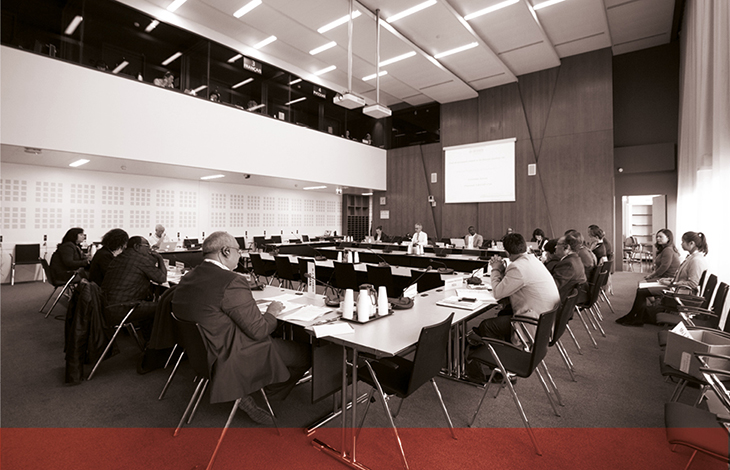4. Participation, credentials and registration

In addition to the Parties, observers such as States that are not Parties to the WHO FCTC, international intergovernmental organizations (IGOs) and non-governmental organizations (NGOs) are also entitled to attend the COP and take part in the discussions.
COP sessions are very well-attended, reflecting the commitment from governments and observers in implementing the WHO FCTC.
4.1. Parties to the Conference of the Parties
All Parties are invited to participate in the sessions of the COP and enjoy the equal rights.
In accordance with the function and roles designated by the Parties, a Party delegation may consist of a head of delegation, alternative representatives and advisers, see Rule 16 of the ROP.
As a Party delegate you will be granted access to all public, open and restricted sessions.
Delegations use their country nameplates to request the floor. This is done by turning the nameplate to the vertical position in its holder. The intervention can be made when the President or the chairs of the committees call the country name. A request to raise a point of order is made by forming a “T” with the nameplate and one arm.
Decisions by COP are usually reached by consensus. Nevertheless, the treaty provides for voting if required, and in this case each Party shall have one vote.
Curious to know when a country became a Party to the WHO FCTC? Click here.
4.2. Observers to the Conference of the Parties
States that are not Parties to the WHO FCTC: Also called ‘States non-Party’, these are countries that have not ratified or acceded to the WHO FCTC, and where the WHO FCTC has not entered into force.
States non-Party are considered observers and may participate without the right to vote in public or open meetings and may request the floor to speak, but only after Parties.
International intergovernmental organizations (IGOs) and nongovernmental organizations (NGOs)
IGOs and NGOs observers may participate without the right to vote in public or open meetings and may speak only after Party States, followed by non-Party observers as appropriate.
4.3. Public and media
A limited number of members of the public will be allowed to attend the COP’s plenary and committee meetings, if the COP does not decide otherwise (see Rule 27 of the ROP).
The applications for attendance are submitted on a daily basis at the Conference venue and are granted by the Convention Secretariat on a first-come, first-serve basis. Members of the public will be asked to fill out a Declaration of Interest.
Representatives of the media are considered part of the public, but have to follow an accreditation procedure in line with United Nations practice and separate from the public.
4.4. Credentials
Parties and observers must formally notify the Head of the Convention Secretariat of the composition of their delegation for each session of the COP. Both Parties and States non-Party observers must submit credentials for delegates. These credentials must be issued by the Head of State or Government, the Minister of Foreign Affairs, the Minister of Health or any other competent government authority, see Rule 18 of the ROP.
Although a copy of the credentials shall be submitted through the online registration system, Parties must deliver their original credential documents to the Convention Secretariat if possible before, but no later than 24 hours after, the opening of the session of the COP. The Bureau of the COP can only recognize original documents as formal credentials for delegates.
The COP formally accepts representatives of Parties by recognizing the validity of their credentials and by adopting a Report on Credentials in a plenary meeting. It is important to note that delegates with a decision pending on their credentials will be entitled to participate provisionally in the session (see Rule 20 of the ROP).
For IGO and NGO observers, a nomination letter signed by the head of the organization shall be submitted through the online registration system.
Credentials or nomination letters addressed to WHO officials are not valid.
4.5. Registration
Each delegation to the COP must register via the online registration system and submit their credentials. The registration system opens approximately four months prior to the opening of the session. The link to registration system will be sent to Parties and observers in due course.
The registered delegations are invited to collect their badges the day prior to the opening of the session, or on the morning of the opening.
4.6. Article 5.3 and its guidelines
The Preamble of the WHO FCTC recognizes the “need to be alert to any efforts by the tobacco industry to undermine or subvert tobacco control efforts and the need to be informed of activities of the tobacco industry that have a negative impact on tobacco control efforts”.
There is a fundamental and irreconcilable conflict between the tobacco industry’s interests and public health policy interests.
Article 5.3 stipulates that in setting and implementing their public health policies with respect to tobacco control, Parties shall act to protect these policies from commercial and other vested interests of tobacco industry in accordance with national law.
Article 5.3 guidelines recommend the following:
- Parties should not nominate any person employed by the tobacco industry or any entity working to further its interests to serve on delegations to meetings of the Conference of the Parties, its subsidiary bodies or any other bodies established pursuant to decisions of the Conference of the Parties.
- Furthermore, Parties should ensure that representatives of State-owned tobacco industry do not form part of delegations to any meetings of the Conference of the Parties, its subsidiary bodies or any other bodies established pursuant to decisions of the Conference of the Parties.
Interested in getting more information on Article 5.3 and its guidelines? Click here.
